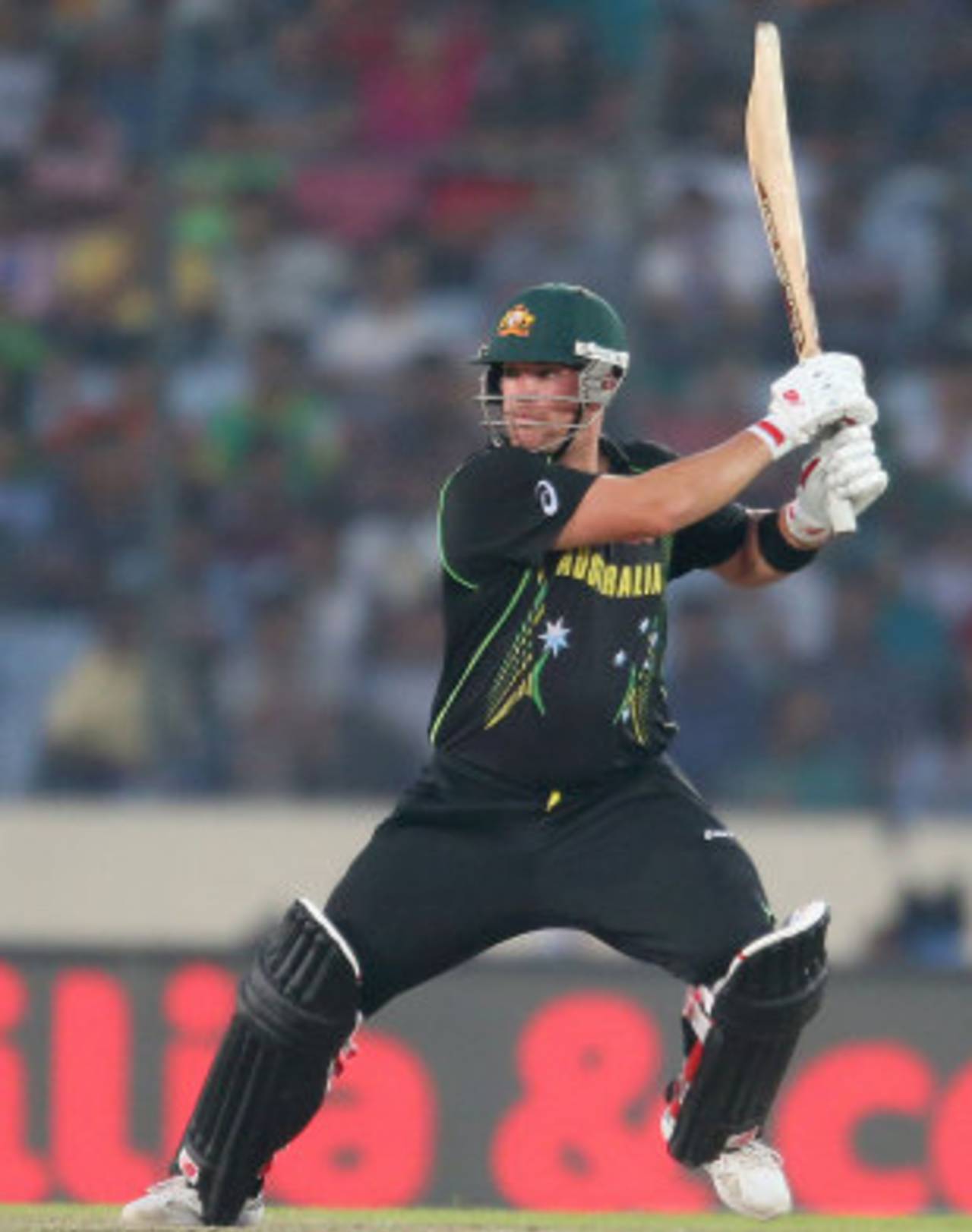Australia's first win at the World T20, a tournament they entered as one of the favourites, only increased the sense of disappointment. Cricket Australia has been beguiled by the shortest format, giving the Big Bash League a prime slot at the heart of the season, while Australians are the most in-demand of foreigners invited to partake in IPL ambrosia. Yet success in this tournament remains elusive.
Beating Bangladesh at least prevented Australia from being bracketed alongside UAE as the only winless teams in the entire competition. After the conquests of recent months, and the burgeoning optimism of the Darren Lehmann era, this was the smallest of beer.
Even in this match, comfortably won as it was, there were signs that Australia's T20 cricket
has some way to go before anyone will back them heavily again. The next global tournament is on the subcontinent once more, in India in two years' time, and the deficiencies batting against spin that were liberally riffed upon in that country this time last year will face insistent probing.
The sight of
Aaron Finch and
David Warner marauding their way to a 98-run opening stand - after previous associations worth 4, 33 and 13 - hinted at what might have been this time around. Such a platform could perhaps have been the difference in narrow but ultimately decisive defeats to Pakistan and West Indies. Both batted with the sort of freedom and aggression that characterised a summer of brutality during the Ashes and subsequent limited-overs larks.
Ah, but that was only against England, you might say, not even as good as the Dutch, on the evidence of their last game. And this domination was only against the more modest spin resources of Bangladesh, rather than Saeed Ajmal, Sunil Narine or R Ashwin, and in a dead game, too. Nevertheless, it gave Finch pause to reflect.
"I think myself and Davey have both been very disappointing in this tournament as a partnership," he said. "What makes it even more disappointing is that it took until the final game to have a big partnership, and to be out of the tournament already. To not be able to progress and then provide a good start for the side was very disappointing and something that is frustrating. We've both come here with high expectations of each other and ourselves. I don't think we played particularly well in the first three games and in such a short format you have to rely on your openers heavily and we didn't do that. So we take a lot of responsibility."
Finch and Glenn Maxwell were Australia's only significant contributors with the bat but there were problems elsewhere. Unusually lackadaisical in the field - an aspect of the game so central to the Lehmann revival - there were further discrepancies against Bangladesh, such as Doug Bollinger's defeatist flop at fine leg in a failed attempt to prevent four. Brad Haddin, having put in an unstinting shift since November, at least had an excuse for a tired miss off Dan Christian's slow bouncer.
With the ball, only
Nathan Coulter-Nile enhanced his reputation and he was the pick of the attack against Bangladesh, who were allowed to make their highest score in seven innings at this tournament. The decision not to field a specialist spinner, although justified by Finch, was suggestive that Australia were unwilling or unable to properly adapt to the conditions.
Brad Hogg played just one game, while
James Muirhead was also given limited opportunities, drawing criticism from Shane Warne in his TV commentary role.
"I think the selection they've got wrong," Warne said. "I know their strength is fast bowling but in these conditions we've seen the wicket turn. Brad Hogg is a pretty experienced bowler, he didn't bowl as well as he would have liked. Young Muirhead, he's going to bowl a few bad balls every now and again but when he lands them he's good. I think they could have gone in with both those spinners, they've got guys like Watson and Maxwell as well. They could have mixed and matched a bit better.
Finch, however, backed up the decision to continue battering away with the quicks. "Bangladesh are very good players of spin and in these conditions they probably haven't been exposed to the pace as often," he said. "I think that that was absolutely the right decision to make. Both our legspinners are very attacking, in Hogg and Muirhead, so if that doesn't work it becomes a situation where you don't really have much to fall back on."
The presence of Mitchell Johnson would certainly have augmented such a strategy but the adherence to it with Bollinger as an unlikely-for-like replacement erred towards dogmatism.
Almost half of Australia's squad, including Finch, Warner and Coulter-Nile, will head on to the IPL to extend their tutorial on subcontinental pitches before an interregnum and a return to international competition against Pakistan in the UAE in October. Success in franchise leagues may plump reputations and bank balances but it will not make up for another World T20 that has passed Australia by.
"I think we've let ourselves down in all three disciplines over the first couple of games," Finch said. "And in such a short format like this that really comes back to haunt you quickly. When you have games back-to-back like this, momentum is really crucial. And we probably let that slip in the West Indies game. When we got to the India game we were out of the tournament. It's very disappointing. We came here with hopes to win the competition and we're going home with nothing."
Alan Gardner is an assistant editor at ESPNcricinfo. He tweets here
